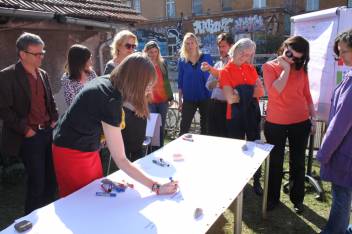 At the end of March, the European Affiliates of HelpAge International gathered in Ljubljana, Slovenia, to agree shared objectives and develop ways of working more closely as a network.
At the end of March, the European Affiliates of HelpAge International gathered in Ljubljana, Slovenia, to agree shared objectives and develop ways of working more closely as a network.
The European Commission funding secured last year has given project partners an opportunity to strengthen our links, to share experiences and knowledge, and to work more effectively as a network for the common purpose that binds us: To improve the lives of older people in developing countries.
Energetic discussions
The conference room was located inside Hostel Celica, a former military prison converted into an artsy and colourful youth hostel, chosen by our host organisation Slovene Philanthropy.
These inspirational surroundings gave way to energetic and sometimes contentious discussions, interspersed with activities that were designed to lead to the final task of drawing up an influencing roadmap for 2014-15.
With the help of our facilitator, Ruth Jolly, we had a productive week discussing what we expect from the HelpAge network, how we would like to see it operate in the future, our key goals, strengths and weaknesses, and how we each plan to meet our influencing objectives.
Common goals, despite differences
From Slovenia to Spain and from Denmark to the Czech Republic, it emerged that we each have our own unique structures, priorities and resourcing limitations, but beyond that there is a common determination to use what we have to raise the profile of the ageing population and influence change as best we can.
As well as redefining the European network’s statement of purpose and breaking down our plan into ambitious but realistic tasks, the workshop gave us a chance to step away from the everyday and to challenge and review our ways of working.
We contributed ideas to the HelpAge International draft strategy and debated the value of the “life course approach” to policy.
Sharing knowledge
We shared practical knowledge by presenting case studies of our experiences, including HelpAge España’s establishment of a committee to lobby for the Convention on the Rights of Older People and Czech Republic-based Zivot 90’s steps to influence European Parliament candidates.
Through these presentations it became clear that the particular challenges we face differ between organisations, based on our respective resourcing and our external environments.
However, we each have something to learn from the others and it is clear that a group of organisations with a common goal can make more impact than one organisation on its own.
Desire for change
Our work in mapping out steps for influencing the post-2015 process over the crucial next few months helped to focus our efforts and bring attention to opportunities of which some had not been aware.
Although Affiliates have varying commitments, and some are not focused purely on international development, we all agreed to fufil at least some of the tasks and the HelpAge International secretariat was keen to take suggestions for tools and support to help us to achieve them.
The most striking element of the week was the passion with which each and every individual in the room approaches their work. Amid all the UN processes and parliamentary corridors we must navigate, this genuine desire for change should not be underestimated.
The biggest challenge for the HelpAge European network now is to keep the momentum going, and to keep sharing wisdom and ideas in order to make our messages resonate more deeply in the months and years to come.
Find out more about our work on the post-2015 process.
The work of the HelpAge EU network is partly funded by the European Union.
The contents of the materials available on this page are the sole responsibility of HelpAge International and can in no way be taken to reflect the views of the European Union.

